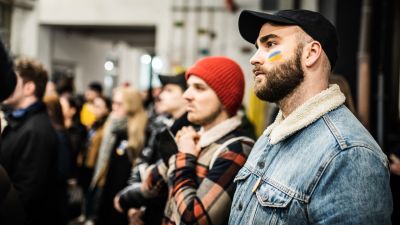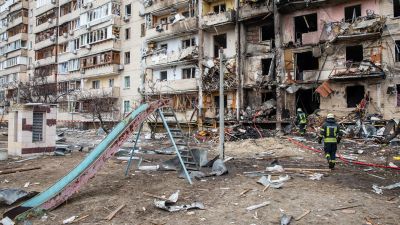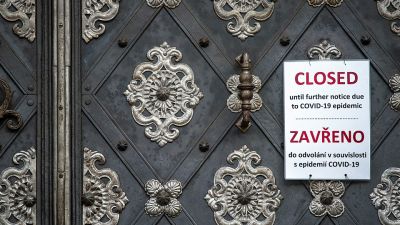Following the pandemic, Charles University students are once again helping in tough times: volunteering at sites around the country to aid refugees who fled Ukraine since the start of the Russian invasion. “Their efforts are remarkable,” says Charles University Chancellor Michal Zima, indicating that, as before, students are making a real difference where it counts. Forum visited Prague’s Main Train Station (Wilson Station) where several hundred students from Charles University are helping. Some are compatriots acting as translators for fellow Ukrainians forced to flee their homeland; many of them share the same home towns.

The situation at Prague's Main Station on 9 March 2022. CU students have volunteered in large numbers there to help people from Ukraine.
According to sources, some two million people have fled Ukraine since the fighting began on 24 February 2022; of those, an estimated 200,000 relocated to the Czech Republic. Women and children are significantly more numerous among those fleeing the war, not least because Ukrainian men between the age of 18 and 60 were told to stay. People displaced by the conflict are helped through a network of Regional Assistance Centres (KACPU) across the country. Every fourth refugee heads to centres in Prague, from where firefighters subsequently transport them to other regions and other registration points.
CU students at centres & main station
In addition to the countless activities of individuals, government organisations and NGOs, two large centres in Prague provide assistance services. One such site is the Prague Congress Centre where, for example, visa applications are handled, while the other KACPU centre is located at the Main Train Station; it mainly provides initial important information to newly arrived Ukrainian nationals. Dozens of trains arrive daily with passengers fleeing Russian aggression. Many of them have come to the Czech Republic to visit or stay with friends and relatives. Others - and there are several hundred of them every day - depend on the help of dozens of students as well as volunteers from NGOs.
Gábina, one of the on-site organisers on the day that we visit [most decline to give their full names as in situations like these last names are a ‘distraction’ – ed. note] is in charge of all volunteers helping that particular day. She says that the working day starts at eight o'clock and then proceeds according to decisions taken by the crisis committee. All volunteers – wearing yellow vests - are given instructions on what needs to be done in the hours ahead.
“All are well 'briefed' and know what to do with people from the moment the train stops and refugees start getting out on the platform. Our job is, for example, to contact the crews who will put people on the buses and take them to other assistance centres or accommodation facilities. We also have a database of accommodation where vacancies are collected. These are mainly used for people with short stays who continue elsewhere. This is always most challenging in the evening. When the trains arrive, people get off here, and the next connection doesn't leave until the morning or the next day. We do have crisis beds upstairs in the hall - there are about 50 of them - but they are usually occupied by eight in the evening. So mothers with children are forced to spend the night in the corridor. If anyone wants to help, please come any evening and you can take someone home. Let them shower, have dinner, sleep over... They will be eternally grateful to you,” the coordinator urges.
At the start, around 200 Charles University students responded quickly to an appeal to provide help to refugees, sent out by the Centre for Knowledge and Technology Transfer (CPPT) in collaboration with CU Point. At the request of the Directorate of the Labour Office, the assistance of Charles University students was first directed to the Prague Congress Centre. At the same time, the CPPT was approached by students of the Third Faculty of Medicine of Charles University, which had already started to provide assistance at the Main Train Station, mainly within the framework of medical assistance and interpreting services. CPPT helped to connect the two groups to ensure that there was also a constant supply of Ukrainian-speaking volunteers from among the students and that all received support.
Around seventy students volunteering as interpreters
“To date, there are about 70 CU volunteers providing interpreting services at the Main Train Station and dozens more students from the Third Faculty. It is the provision of medical services that is absolutely crucial to the functioning of the centre. The students of Charles University are really doing a professional and very useful job in very stressful conditions. Even though the pressure has subsided a bit, mainly due to the rerouting of some train connections to other cities, there are still hundreds of refugees a day that our students and other volunteers are working together with,” says Hubert Topinka, a professional guarantor for relations with non-governmental non-profit organisations and public administration at the Centre for Knowledge and Technology Transfer. Topinka has more than 20 years of experience in organising humanitarian aid in conflict-affected countries. Students offer support and empathy, while continuing to focus on demanding studies.
Czech volunteers are also assisted by volunteers from among Ukrainian residents and Ukrainian students living in the Czech Republic long-term. “Helping our people Is a given but we also owe a great degree of thanks to Czech residents who began helping Ukrainians from day one,” says Maryia, a student from Kharkiv, studying in Prague in her fifth year at the Second Medical Faculty at Charles University. She heads a student group called Medici na ulici (Street Medicine) so it was a matter of course for her to get involved in volunteering at the station. So far, she has been helping mostly with coordination and interpreting.
Help in the Czech Republic, but also directly to Ukraine
“In addition, together with other Ukrainian classmates, we are trying to arrange the distribution of medicine to Ukraine, because - unfortunately - centralised help is not yet reaching everywhere, it's more complicated,” says the Second Faculty of Medicine student, who, under the circumstances, preferred volunteering in Prague to traveling in Portugal on an upcoming Erasmus stay. In the coming days, she and her classmates should strengthen the team providing medical assistance at the assistance centre at the station.
Daniil, a second-year student at the Third Faculty of Medicine at Charles University, is another main coordinator of Ukrainian-speaking interpreters at the station. He nods in agreement as Maryia speaks. It was he who helped come up with the involvement of Charles University students in helping at the country's largest train station. He is at home in the Ukrainian city of Dnipro. Right now he's holding a megaphone as a train is due to arrive in a few minutes, so he needs to be ready. “The first words they will hear from me here are: 'Dear friends from Ukraine, if you need help, please contact the volunteers in yellow vests...'” Daniil says in Czech. And as we continue to learn, the volunteers at the station help new arrivals to get everything they need, from accommodation to phone SIM cards.
Maryia departs to provide medical help to a child suffering from nausea. It is children who are the most affected by the extreme change in their lives: with few exceptions at the Main Train Station, they are very tired, crying, lacking an appetite. A little girl of about three is helped in an improvised medical station - a tent located in a corner of the crisis centre. There, she is taken in by female med students from the Third Medical Faculty of Charles University who are on duty at the moment. Volunteer med students are understandably in constant contact with the dispatchers at Prague hospitals; they can ask for a consultation at any time or for a possible transfer to hospital should a child or grown-up fall ill.

Students from the Third Medical Faculty of Charles University, whose yellow vests highlight the faculty logo .
“I wrote to my friends from the faculty asking if they would like to help with medical assistance and equipment. In a few hours everything was sorted out. The tent was up and we had plenty of medical supplies. Thanks to an online app, we are now making arrangements within a large group of volunteers from Ukraine. Actually, it includes all the people who help Ukrainian refugees on behalf of Charles University. Thanks to it, we learn in time what needs to be done where, where to help... The most important information for the refugees is concentrated there. We have a lot of ideas, we just need to implement them,” Daniil says.
Meeting compatriots from his hometown
Daniil's task is to explain to other volunteers at the Main Train Station where help is needed at any given moment, based on the requests arising from the daily meetings of the crisis team. “Being Ukrainian, I understand well what people here are going through. Yesterday - imagine - I met about eight people from my hometown! One of them is a 15-year-old boy now helping us here. Instead of being on spring break somewhere, he's here with us,” the med student says with emotion.
There are currently about 150 on the list of medical volunteers who run a makeshift infirmary at the station. “It may seem to you that there are many of us, but the truth is that it is very difficult to combine a demanding school schedule with the work of a volunteer. By having mandatory classes, we can't be here as much as we need to be. We have to rotate so that we can get some sleep," says Petra, a medical student at the Third Faculty. “There are ten people on duty here on a regular basis. Of these, there are always two senior med students - fourth through sixth years, they are in charge. They are assisted by a young med student - a freshman to junior who has taken either a paramedic course or related course. And we have freshmen and sophomores helping with non-medical stuff, and we have interpreters - our own classmates from Ukraine or Russia.”
“Charles University is truly appreciative of the enormous enthusiasm and determination our students have shown in helping Ukrainian refugees,” says Chancellor Michal Zima. “After all, enthusiasm is typical for young students and they already demonstrated their determination earlier, during the epidemic. It is practically two years ago to the day that med students first began volunteering during the Covid crisis, setting up coordination cells at the faculties [the first Covid cases in the Czech Republic appeared on 1 March 2020 – ed. note]... Now they're not waiting for anything…The real impact of their volunteer work can be seen at every step for which we owe them enormous thanks,” Zima says.






























